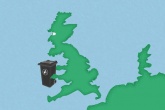Avoiding a dog’s Brexit for waste and resources
Libby Peake, Senior Policy Adviser at the Green Alliance think tank, says Brexit talk must turn to action if we are to avoid an environmental policy gap.
 Come April of this year, UK newspaper headlines and the world of politics alike will have been dominated by Brexit for two whole years, with hardly a day passing when it wasn’t one of the main stories since the referendum campaigns kicked off on 15 April 2016. This is only set to continue, with the 2018 legislative programme (as well as politicians’ minds) continuing to focus on Brexit.
Come April of this year, UK newspaper headlines and the world of politics alike will have been dominated by Brexit for two whole years, with hardly a day passing when it wasn’t one of the main stories since the referendum campaigns kicked off on 15 April 2016. This is only set to continue, with the 2018 legislative programme (as well as politicians’ minds) continuing to focus on Brexit.
At the same time, though, the government does have to get on with governing other areas, and it seems like the environment in general – including resources and waste in particular – is one of those areas where it has focused its attention. Where there was previously not enough English domestic policy, there has been considerable action in recent months: the Clean Growth Strategy confirmed there would be a renewed strategy on resources and waste in 2018 as part of a move towards ‘zero avoidable waste to landfill’ by 2050, while the Industrial Strategy explicitly endorsed a ‘regenerative circular economy’, and even more details are expected in the long-awaited 25-Year Environment Plan, due to be published any moment now.
These are all welcome steps, but it must be remembered as well that the hard-pressed civil servants who will be working up the resources and waste strategy already have a lot on their Brexit-dominated plates: in addition to completing the highly complex (and rather mundane) process of transposing 1,100 pieces of environmental legislation from the EU to the UK, Defra will need to reinvent the UK’s agricultural subsidy regime, draw up new arrangements on fisheries (et cetera, et cetera) over the next few years.
To achieve a good outcome for resources in the face of these considerable competing demands, the government will have to carry out two critical tasks through the Brexit process: managing divergence from existing EU waste and resource governance; and creating effective new policy in line with some of the promises outlined above.
Green Alliance’s latest report for the Circular Economy Task Force, ‘A new direction for UK resource strategy after Brexit’, sets out the minimum steps the government will have to take to achieve a good outcome as we leave the EU.
In the first instance, our report stresses that we will need to ensure that we don’t develop different environmental standards to our European neighbours, as such differences create trade barriers and market distortions (and, in fact, a desire to avoid such distortions was the explicit reason the EU introduced a common environmental policy in the early 1970s).
This must, at the very least, include:
- continued cooperation on ecodesign standards to facilitate trade, combined with domestic application of standards to protect domestic businesses and consumers from low quality imports;
- negotiating full access to the world-leading, EU-administered REACH chemicals regime to protect citizens from dangerous chemicals and minimise animal testing, business costs and bureaucracy; and
- continued collaboration on waste rules, guided by underlying principles such as ‘polluter pays’ and the ‘precautionary principle’.
All of this must, of course, be effectively governed through monitoring, enforcement and legal redress, and it will be crucial that Environment Secretary Michael Gove follows through on his promise to avoid an environmental ‘governance gap’.
Focusing on the here and now is important, but so is future strategy. To avoid an environmental policy gap opening up and ensure England is fit for a future outside the EU, Defra’s resource strategy must include new policies to achieve the laudable ambitions announced in recent months. At the very least, this should include: adopting the same recycling targets as the EU’s Circular Economy Package and enhancing them with goals (along with the policies and funding) for waste minimisation, commercial and industrial waste and resource productivity; mandatory food waste collections from households and businesses; and extended producer responsibility rules to make manufacturers responsible for the full environmental costs of their products.
If Defra gets this right – with the help of the many talented people in the resources industry who have been calling for increased ambition for years – it will surely generate some good news stories to provide welcome respite from Brexit reporting over the coming months. Here’s hoping… 









